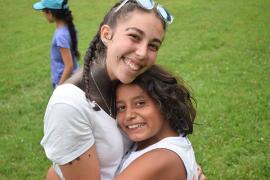I’ve often been taught to look at a person through the lens of a prism. On one side, you can see only a clear, flat, one-dimensional object, but when the light filters through you are left with all the colors of the rainbow. This image rings true when looking at anyone. What you see isn’t always what you think or what you get. So many different things make up an individual. Some you can easily see, such as hair color and eye color. Other things are invisible. For example, when looking at someone’s outside, you can’t tell their religion, family makeup, history, socioeconomic status, and so much more.
Why is it important to remember the prism analogy when meeting and interacting with campers and camp staff? Because the parts you don’t see are actually some of the most important facets of a person. Being able to determine the invisible will become invaluable to your success as a counselor, director, or other camp staff member.
Charlie is a 10-year-old boy who is new to camp this summer. He is neurodivergent, very high-functioning, but with a diagnosis that fits within the autism spectrum. Charlie has trouble interpreting other kids’ actions and emotions. Sometimes Charlie doesn’t understand the joke, or he may smile when a neurotypical child wouldn’t dare. Charlie doesn’t mean any harm, and he tries so hard to fit in, but some of the campers in Charlie’s bunk are really frustrated with his behavior. They are impatient or get annoyed at times when Charlie is just struggling to connect.
In cases like Charlie’s, it’s imperative that the camp staff have an open mind and some good tools in their tool kit to help Charlie have a successful summer — and to help merge him into the camp community. Just know that a first meeting with a camper like Charlie may not present outwardly obvious signs that he won’t always act like a typical 10-year-old boy. Many neuroatypical kids matriculate into mainstream camp settings each year. Sometimes parents are open with camp directors about potential challenges and useful skills to help out these campers, but other times parents send their kids off without a word, wanting them to have a clean slate at camp. It is important to take the time to appreciate each camper for who they are, and help campers find similarities with each other.
Talia is a 13-year-old who is not new to camp but has recently identified publicly as gender fluid and chosen to be referred to with the pronoun “they.” During introductions at the very start of the camp session, Talia’s counselor refers to them as “her/she.” Talia immediately feels isolated and on guard.
Sharing preferred personal pronouns when identifying oneself to others is becoming more of a cultural norm. With this increase in freedom to self-identify, more campers are using alternative pronouns. Microaggressions are real and can cause campers significant stress. Talia may feel they are being purposefully labeled incorrectly. Even if the counselor does not intend to cause harm, her actions can lead to Talia feeling alone and anxious. A stressed camper is usually not a successful one — and left unaddressed, those negative feelings can bring down the morale of a cabin.
Adding to the levels of daily stress, the current political climate in the US can also present a challenge for some invisible (or visible) differences. Women, LGBTQ+ communities, individuals of color, immigrants, and more may bring feelings of unease into the camp setting based on their past experiences and traumas. Providing counselors and other camp staff with formal diversity, equity, and inclusion training can help them avoid microaggressions or outward forms of discrimination.
Redirection is key when tensions rise due to a misunderstanding or misinterpretation of behavior. Pointing out areas of conflict gently and matter-of-factly is often the way to go. Remember, disrespect or rudeness is never appropriate. Approach each and every camper with compassion and kindness. Make every attempt to connect with each camper at their level — and to see them for the unique and amazing individual they are. Help others to do the same, and, in the end, you will likely all have a wonderful and successful summer.
Jane Glazer, MSN, MA, CPNP, FNP-BC, has practiced in urgent care, college health, and residential camp health. She is interested in education, evidence-based best practices, and providing care to campers in a safe and fun way.


